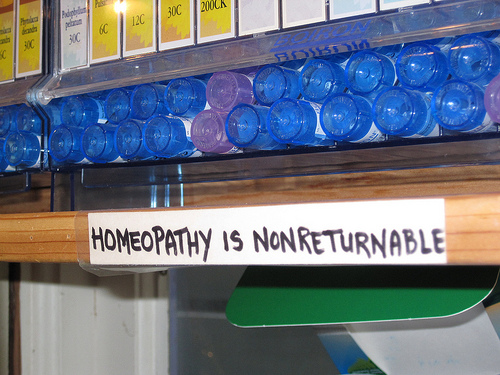April 10-16 is World Homeopathy Awareness Week, dedicated by homeopaths to promote an awareness and understanding of homeopathy. I think that’s an excellent idea. Homeopathy is an elaborate placebo system of sugar pills. It doesn’t work. It cannot work. If it did, physics, biochemistry and pharmacology as pharmacists know it would be false. Of all alternative medicine, homeopathy is the most implausible of them all. Based on the absurd notion of “like cures like” (which is sympathetic magic, not science), proponents of homeopathy believe that any substance can be an effective remedy if it’s diluted enough: raccoon fur, the sunlight reflecting off Saturn, even pieces of the Berlin Wall are all part of the homeopathic pharmacopeia. And when I say dilute, I mean dilute. The 30C “potency” is common – it’s a ratio of 10-60. You would have to give two billion doses per second, to six billion people, for 4 billion years, to deliver a single molecule of the original material. So remedies are effectively and mathematically inert – they are pure placebo. Not surprisingly, there is no persuasive medical evidence that these products have therapeutic effects.
Homeopathy could be written off as a harmless nostrum if it caused no harm. But that’s not the case. Homeopathy can delay patients from seeking science-based treatments. Consumers buy products thinking they are effective, when they have no active ingredients. When they’re on pharmacy shelves, it’s unfair and unethical to expect patients to be able to able to distinguish real drugs from placebos. A paper from Michael Baum and Edzard Ernst, writing in the American Journal of Medicine in 2009 made this statement about homeopathy:
It is considered unethical for modern medical practitioners to sink to this kind of deception that denies the patient his or her autonomy. Secondly, by opening the door to irrational medicine alongside evidence-based medicine, we are poisoning the minds of the public. Finally, if we don’t put a brake on the increasing self-confidence of the homeopathic establishment, they will cease to limit their attention to self-limiting or nonspecific maladies.
Baum and Ernst were correct in their evaluation, as you see in this roundup of homeopathic issues from around the world: Continue reading





You must be logged in to post a comment.